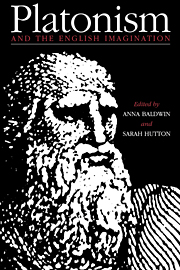Book contents
- Frontmatter
- Contents
- Notes on contributors
- Preface
- I ANTIQUITY
- II THE EARLY CHRISTIAN PERIOD AND THE MIDDLE AGES
- III THE RENAISSANCE AND THE SEVENTEENTH CENTURY
- IV THE EIGHTEENTH CENTURY
- V THE NINETEENTH CENTURY
- VI THE TWENTIETH CENTURY
- 24 Introduction
- 25 Yeats and Platonism
- 26 Virginia Woolf and Plato: the Platonic background of Jacob's Room
- 27 Plato and Eliot's earlier verse
- 28 The Cantos of Ezra Pound: ‘to build light’
- 29 Platonism in Auden
- 30 Platonism in Iris Murdoch
- Bibliography
- Index
24 - Introduction
Published online by Cambridge University Press: 15 December 2009
- Frontmatter
- Contents
- Notes on contributors
- Preface
- I ANTIQUITY
- II THE EARLY CHRISTIAN PERIOD AND THE MIDDLE AGES
- III THE RENAISSANCE AND THE SEVENTEENTH CENTURY
- IV THE EIGHTEENTH CENTURY
- V THE NINETEENTH CENTURY
- VI THE TWENTIETH CENTURY
- 24 Introduction
- 25 Yeats and Platonism
- 26 Virginia Woolf and Plato: the Platonic background of Jacob's Room
- 27 Plato and Eliot's earlier verse
- 28 The Cantos of Ezra Pound: ‘to build light’
- 29 Platonism in Auden
- 30 Platonism in Iris Murdoch
- Bibliography
- Index
Summary
Platonism in the twentieth century has undergone many challenges and transformations while continuing as a major reservoir of the imagination in English letters. Though attitudes have run a course from Late Romantic enthusiasm to Postmodernist detachment, many leading writers and thinkers have steadily acknowledged the Platonic tradition as an important heritage – one not easily defined, yet perhaps the more compelling on that account.The attraction of Platonism for such writers springs from the value they attach to the role of reason and spirit in a period when events of Western history have posed a serious threat to the survival of humanism. The quest for the just society has foundered, and philosophy has rebelled against rationalism. Yet in the face of social fragmentation, many modern Platonists believe that eternal realities such as the Good, love and truth still give meaning and value to human life – even if ‘Things fall apart ’, as W.B. Yeats perceived in ‘The Second Coming ’, or ‘The scientists are in terror ’, as Ezra Pound declared in The Cantos (115/794).
Since 1900, classical studies have advanced greatly, resulting in the establishment of the canon of Plato's writings and new English translations of the Platonic corpus. The standard Greek text of Plato dates from the turn of the century, being the edition of Ioannes (John) Burnet, Platonis Opera, 5 vols. (1900–7, reprinted 1973). Benjamin Jowett's English translation of the major works (4 vols., 1871) is still, in its latest revisions, highly esteemed. All of Plato's writings, constituting the canon in Greek and English, are available in the Loeb Classical Library.
- Type
- Chapter
- Information
- Platonism and the English Imagination , pp. 271 - 278Publisher: Cambridge University PressPrint publication year: 1994

